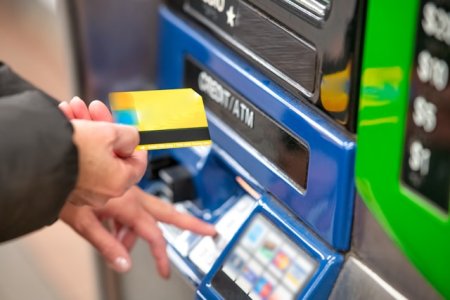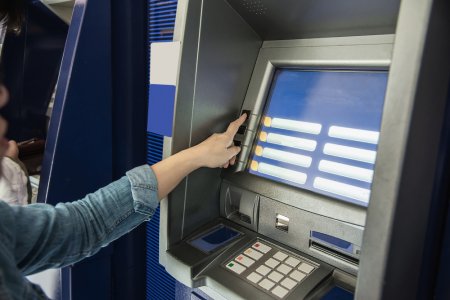‘Dangerous reality’: Vanishing bank-owned ATMs threaten cash access
By
Seia Ibanez
- Replies 35
The convenience of withdrawing cash from an ATM is something many can take for granted.
However, recent trends suggest that this convenience is under threat, with bank-owned and fee-free ATMs disappearing at an alarming rate.
This shift is not only making it harder for Aussies to access their own cash, but it's also becoming increasingly expensive, raising concerns among financial experts.
Over the past seven years, the number of bank-owned and fee-free ATMs has more than halved, replaced by privately operated devices that charge users up to $4 per transaction.
This trend is driven by major financial institutions closing branches and mothballing ATMs, creating a void filled by major corporations and small-time investors looking to cash in.
Professor Steve Worthington from Swinburne University explained that banks, particularly the big four, are ‘obsessed with their cost-to-income ratios’.
‘Anything they can do to reduce their costs will improve the gap between their outgoings and their incomings, hence improving their profitability,’ he said.
'One of the biggest costs for banks and other financial institutions is running branches, in terms of the premises themselves and the personnel in them. That’s why there have been a lot of branch closures.’
‘And very often, ATMs operated by major banks are located in their branches, so when they close a branch, they remove an ATM,' he added.
Data from the Australian Prudential Regulation Authority (APRA) showed that since June 2017, banks have collectively closed 2100 of their branches, with 424 shutting in the 12 months to June 2023 alone.
Another factor contributing to the decline of bank-owned ATMs is the industry-wide decision in 2017 to stop charging customers of other financial institutions a $2 fee to withdraw cash.
In 2017, there were 13,814 bank-owned ATMs across Australia. By June 2023, this number had more than halved to 5,693. Of the 8,121 fewer machines, almost 23 per cent–or 1,863 in total–were lost in regional and remote parts of the country.
APRA doesn’t have the numbers of non-bank ATMs in Australia, and a spokesman said that ‘there are no legal requirements for banks to operate ATMs or branches’.
The Australian Payments Network (APN) reports that as of December 23, there were a total of 24,346 operational ATMs in Australia.
Subtracting the bank-owned machines reported by APRA suggested some 19,000 private devices.
It is believed that this constitutes a higher number than every bank-owned machine combined in 2017—before financial organisations stopped charging customers to use them.
The fact that private enterprises have swept in to take up market share suggests there’s still a place for ATMs.
'There’s clearly still demand out there,' Worthington said.
'And it’s obviously very profitable.'
The APN reported 358 withdrawals from ATMs in the 12 months to June 2023, which was 5.5 per cent higher than the previous year. However, it is lower than the 2018-10 figure of 572 million transactions.
Despite the demand for ATMs, the Australian Banking Association (ABA) reported that the overwhelming majority of bank transactions now occur digitally—98.9 per cent.
Aussies have been the fastest adopters of mobile and cashless payments in the world, driven in large part by a 'world-class payments infrastructure', the ABA said.
It added that Australia has a higher branch density than other countries at 24 branches per 100,000 people.
The report also showed that over 3000 Australia Point outlets have banking capabilities, including deposits and withdrawals, via the Bank@Post service.
However, this shift towards digital transactions doesn't negate the need for cash.
In late 2022, the Reserve Bank of Australia (RBA) published its sixth triennial Consumer Payments Survey, examining 13,000 transactions made by a representative sample of 1,000 people.
The findings suggested that within three years, the share of cash payments decreased by half, from 32 per cent of all in-person transactions to only 16 per cent.
‘If one considers all payments, including online payments, cash payments made up 13 per cent by number and around eight per cent by value in 2022,’ stated the RBA.
‘While cash was used less across payments of all sizes, the decline was particularly noticeable for smaller-sized payments. Indeed, the share of payments under $10 made with cash nearly halved over the three years to 2022... (while) cash use for higher value transactions also continued to decrease, albeit at a slower rate.’
Worthington remained sceptical of the RBA data, noting that it was based on a survey where individuals recorded their spending and payment methods and involved only 1,000 participants.
‘Roughly speaking, if you were to collect all of the money that’s been printed and floating around and divided it by Australia’s population, we’d each get about $4,000. That’s a lot of cash.’

Although major players are entering the ATM market, many smaller and independent operators are also participating. ATM brokers facilitate the purchase or lease of machines, making the process accessible and cost-effective.
Individuals with suitable locations, such as convenience stores or petrol stations, can purchase a new ATM for $8,000 to $12,000 or a used one for as little as $3,000. Alternatively, renting an ATM can cost as little as $300 monthly.
Processing fees for transactions typically amount to $1, with privately owned machines sometimes charging users up to $4 per transaction. Machines in high-traffic areas can generate significant revenue.
Despite the RBA's findings on declining cash usage, public sentiment toward physical money remains unchanged. Few Australians support the idea of a cashless society, with many strongly opposed to it.
The RBA noted that a significant portion of respondents expressed concern about limited access to cash or the inability to use it as a payment method.
Very few Aussies support the notion of a cashless society, despite more going digital.
‘Consistent with previous surveys, the 2022 (results) indicated that some Australians would be negatively affected if cash was difficult to access or if shops stopped accepting it as a payment method,’ the RBA noted.
‘Overall, just over one-quarter of respondents – regardless of how intensively they used cash–reported that they would experience a “major inconvenience” or “genuine hardship” if cash were hard to access or use.’
Worthington emphasised that for some individuals, cash is essential.
‘It might be someone who’s elderly or who has intermittent or no access to the internet, and for whom cash is vitally important,’ he said.
‘We’re also reminded time and time again about how important cash is when there are natural disasters. In Victoria, recently, when there were mass power outages, you couldn’t do anything [at] all. The only way to get by was using cash.’
Similarly, the complete outage of the Optus telecommunications network late last year left numerous business owners unable to process payments via EFTPOS.
‘If we don’t use it, we’ll lose it, Worthington cautioned.
‘That’s the danger, that if we keep using less and less cash, then as with the bank branches and the ATMs, there’ll be less and less access to it–fewer ways to use it. Already we see merchants not accepting cash anymore.’
‘That could be a sign of things to come. I think that’s a dangerous (reality) to consider.’
Westpac emphasised its extensive network of fee-free ATMs, including partnerships with other ATM providers.
For example, patrons can utilise ATMs without any fees.
‘We are proud to offer our customers access to the largest combined fleet of fee-free ATMs of any of the four major banks in Australia, at almost 7,000 locations nationwide, including 857 that are owned by Westpac,’ a spokesperson said.
‘Our customers can make fee-free withdrawals at Westpac, BankSA, Bank of Melbourne and St. George ATMs, as well as ATMs operated by Precinct, ATMx by Armaguard, and the other major banks.’
‘Customers can also withdraw fee-free cash over the counter in any of our branches and via Australia Post’s Bank@Post facility.’
Addressing concerns over the rise in branch closures, CBA CEO Matt Comyn has previously assured clients that the institution has no intention of abandoning cash.
Additionally, it maintains the most extensive branch network among all Australian banks.
‘We maintain a fleet of 1,956 ATMs, the largest bank-operated ATM network in Australia,’ a CBA representative remarked.
‘Although the number of ATMs we operate has decreased, we have opted to sustain the most extensive and convenient network, which surpasses that of our closest major bank competitor by twofold.’
CBA has been opening what it calls ‘specialist centres’ or ‘service centres’ across the country. This feature is different from traditional branches as they are not allowed to handle cash transactions over the counter.
NAB refrained from providing a response, although it is understood that the institution's policy mandates that if an ATM is decommissioned, a nearby Bank@Post facility must be accessible.
Moreover, NAB has refrained from privatising any of its ATMs, and transactions conducted on its machines remain free of charge.
As of this writing, ANZ has not commented on this issue, but it was reported they have been ‘secretly’ phasing out cash services from several branches. You can read more about the story here.
 What are your thoughts on this trend? Have you been affected by the disappearance of bank-owned ATMs? Share your experiences in the comments below.
What are your thoughts on this trend? Have you been affected by the disappearance of bank-owned ATMs? Share your experiences in the comments below.
However, recent trends suggest that this convenience is under threat, with bank-owned and fee-free ATMs disappearing at an alarming rate.
This shift is not only making it harder for Aussies to access their own cash, but it's also becoming increasingly expensive, raising concerns among financial experts.
Over the past seven years, the number of bank-owned and fee-free ATMs has more than halved, replaced by privately operated devices that charge users up to $4 per transaction.
This trend is driven by major financial institutions closing branches and mothballing ATMs, creating a void filled by major corporations and small-time investors looking to cash in.
Professor Steve Worthington from Swinburne University explained that banks, particularly the big four, are ‘obsessed with their cost-to-income ratios’.
‘Anything they can do to reduce their costs will improve the gap between their outgoings and their incomings, hence improving their profitability,’ he said.
'One of the biggest costs for banks and other financial institutions is running branches, in terms of the premises themselves and the personnel in them. That’s why there have been a lot of branch closures.’
‘And very often, ATMs operated by major banks are located in their branches, so when they close a branch, they remove an ATM,' he added.
Data from the Australian Prudential Regulation Authority (APRA) showed that since June 2017, banks have collectively closed 2100 of their branches, with 424 shutting in the 12 months to June 2023 alone.
Another factor contributing to the decline of bank-owned ATMs is the industry-wide decision in 2017 to stop charging customers of other financial institutions a $2 fee to withdraw cash.
In 2017, there were 13,814 bank-owned ATMs across Australia. By June 2023, this number had more than halved to 5,693. Of the 8,121 fewer machines, almost 23 per cent–or 1,863 in total–were lost in regional and remote parts of the country.
APRA doesn’t have the numbers of non-bank ATMs in Australia, and a spokesman said that ‘there are no legal requirements for banks to operate ATMs or branches’.
The Australian Payments Network (APN) reports that as of December 23, there were a total of 24,346 operational ATMs in Australia.
Subtracting the bank-owned machines reported by APRA suggested some 19,000 private devices.
It is believed that this constitutes a higher number than every bank-owned machine combined in 2017—before financial organisations stopped charging customers to use them.
The fact that private enterprises have swept in to take up market share suggests there’s still a place for ATMs.
'There’s clearly still demand out there,' Worthington said.
'And it’s obviously very profitable.'
The APN reported 358 withdrawals from ATMs in the 12 months to June 2023, which was 5.5 per cent higher than the previous year. However, it is lower than the 2018-10 figure of 572 million transactions.
Despite the demand for ATMs, the Australian Banking Association (ABA) reported that the overwhelming majority of bank transactions now occur digitally—98.9 per cent.
Aussies have been the fastest adopters of mobile and cashless payments in the world, driven in large part by a 'world-class payments infrastructure', the ABA said.
It added that Australia has a higher branch density than other countries at 24 branches per 100,000 people.
The report also showed that over 3000 Australia Point outlets have banking capabilities, including deposits and withdrawals, via the Bank@Post service.
However, this shift towards digital transactions doesn't negate the need for cash.
In late 2022, the Reserve Bank of Australia (RBA) published its sixth triennial Consumer Payments Survey, examining 13,000 transactions made by a representative sample of 1,000 people.
The findings suggested that within three years, the share of cash payments decreased by half, from 32 per cent of all in-person transactions to only 16 per cent.
‘If one considers all payments, including online payments, cash payments made up 13 per cent by number and around eight per cent by value in 2022,’ stated the RBA.
‘While cash was used less across payments of all sizes, the decline was particularly noticeable for smaller-sized payments. Indeed, the share of payments under $10 made with cash nearly halved over the three years to 2022... (while) cash use for higher value transactions also continued to decrease, albeit at a slower rate.’
Worthington remained sceptical of the RBA data, noting that it was based on a survey where individuals recorded their spending and payment methods and involved only 1,000 participants.
‘Roughly speaking, if you were to collect all of the money that’s been printed and floating around and divided it by Australia’s population, we’d each get about $4,000. That’s a lot of cash.’

Worthington said that demand for ATMs is still high and it’s ‘obviously very profitable’. Credit: Unsplash
Although major players are entering the ATM market, many smaller and independent operators are also participating. ATM brokers facilitate the purchase or lease of machines, making the process accessible and cost-effective.
Individuals with suitable locations, such as convenience stores or petrol stations, can purchase a new ATM for $8,000 to $12,000 or a used one for as little as $3,000. Alternatively, renting an ATM can cost as little as $300 monthly.
Processing fees for transactions typically amount to $1, with privately owned machines sometimes charging users up to $4 per transaction. Machines in high-traffic areas can generate significant revenue.
Despite the RBA's findings on declining cash usage, public sentiment toward physical money remains unchanged. Few Australians support the idea of a cashless society, with many strongly opposed to it.
The RBA noted that a significant portion of respondents expressed concern about limited access to cash or the inability to use it as a payment method.
Very few Aussies support the notion of a cashless society, despite more going digital.
‘Consistent with previous surveys, the 2022 (results) indicated that some Australians would be negatively affected if cash was difficult to access or if shops stopped accepting it as a payment method,’ the RBA noted.
‘Overall, just over one-quarter of respondents – regardless of how intensively they used cash–reported that they would experience a “major inconvenience” or “genuine hardship” if cash were hard to access or use.’
Worthington emphasised that for some individuals, cash is essential.
‘It might be someone who’s elderly or who has intermittent or no access to the internet, and for whom cash is vitally important,’ he said.
‘We’re also reminded time and time again about how important cash is when there are natural disasters. In Victoria, recently, when there were mass power outages, you couldn’t do anything [at] all. The only way to get by was using cash.’
Similarly, the complete outage of the Optus telecommunications network late last year left numerous business owners unable to process payments via EFTPOS.
‘If we don’t use it, we’ll lose it, Worthington cautioned.
‘That’s the danger, that if we keep using less and less cash, then as with the bank branches and the ATMs, there’ll be less and less access to it–fewer ways to use it. Already we see merchants not accepting cash anymore.’
‘That could be a sign of things to come. I think that’s a dangerous (reality) to consider.’
Westpac emphasised its extensive network of fee-free ATMs, including partnerships with other ATM providers.
For example, patrons can utilise ATMs without any fees.
‘We are proud to offer our customers access to the largest combined fleet of fee-free ATMs of any of the four major banks in Australia, at almost 7,000 locations nationwide, including 857 that are owned by Westpac,’ a spokesperson said.
‘Our customers can make fee-free withdrawals at Westpac, BankSA, Bank of Melbourne and St. George ATMs, as well as ATMs operated by Precinct, ATMx by Armaguard, and the other major banks.’
‘Customers can also withdraw fee-free cash over the counter in any of our branches and via Australia Post’s Bank@Post facility.’
Addressing concerns over the rise in branch closures, CBA CEO Matt Comyn has previously assured clients that the institution has no intention of abandoning cash.
Additionally, it maintains the most extensive branch network among all Australian banks.
‘We maintain a fleet of 1,956 ATMs, the largest bank-operated ATM network in Australia,’ a CBA representative remarked.
‘Although the number of ATMs we operate has decreased, we have opted to sustain the most extensive and convenient network, which surpasses that of our closest major bank competitor by twofold.’
CBA has been opening what it calls ‘specialist centres’ or ‘service centres’ across the country. This feature is different from traditional branches as they are not allowed to handle cash transactions over the counter.
NAB refrained from providing a response, although it is understood that the institution's policy mandates that if an ATM is decommissioned, a nearby Bank@Post facility must be accessible.
Moreover, NAB has refrained from privatising any of its ATMs, and transactions conducted on its machines remain free of charge.
As of this writing, ANZ has not commented on this issue, but it was reported they have been ‘secretly’ phasing out cash services from several branches. You can read more about the story here.
Key Takeaways
- The number of bank-owned and fee-free ATMs in Australia has more than halved in the past seven years, leading to concerns over access to cash and rising transaction costs.
- Major financial institutions are reducing their physical footprint to cut costs, leading to privately operated ATMs filling the gap and often charging high fees.
- Despite the decline in cash usage, many Australians oppose a completely cashless society and rely on cash, especially during emergencies or outages.
- Banks have responded by highlighting their investments in technology and partnerships to provide fee-free ATM access and reassure customers of continued cash availability.








